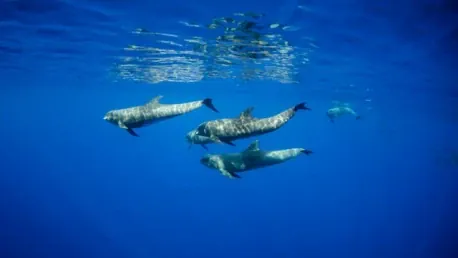Nestled between the Gulf of Mexico and the Atlantic Ocean, the Florida Keys form a breathtaking archipelago sprawling nearly 200 kilometers. As home to the world’s third-largest barrier reef, this unique ecosystem is a lifeline for the local community, bolstering commercial and recreational fishing and providing a natural shield against storm surges. Yet, the region grapples with mounting environmental challenges, such as the degradation of coral reefs and threats to marine wildlife, including the beloved sea turtles. The intricate dance between tourism and marine conservation efforts is paramount in preserving the fragile beauty and ecological integrity of the Florida Keys.
The Role of Ecotourism in Conservation
Ecotourism emerges as a crucial ally in the fight to protect the Florida Keys’ natural environment. For the local population, the health of the coral reef is deeply intertwined with their own well-being, as they bear witness to the alarming environmental degradation. One shining example of the synergy between tourism and conservation is the Florida Keys Tourism Council’s new Eco-Experience Trail. This initiative endeavors to harmonize tourism activities with robust environmental stewardship.
Located in this delicate balance between indulgence and sustainable tourism are pioneering efforts like the Eco-Experience Trail. Carol Shaughnessy, a spokesperson for the council, emphasizes the burgeoning enthusiasm among tourists to not only experience but also support the natural world. A growing number of coral restoration projects now welcome vacationers to roll up their sleeves and actively contribute to their conservation work, transforming ecotourism into an immersive, hands-on venture. This proactive involvement seeks to instill a sense of responsibility and foster lasting changes in tourists’ behavior even after they return home.
Voluntourism: Tourists as Environmental Stewards
Tourists are increasingly becoming environmental stewards through ‘voluntourism’ programs. These programs offer a range of activities, from aiding scientists in underwater coral nurseries to taking part in eco-friendly tours. The hands-on interaction provided aims to instill a sense of responsibility and inspire changes in the daily lives of tourists once they return home. By engaging directly in conservation efforts, visitors forge a personal connection to the natural environment and develop a greater appreciation for the importance of safeguarding it.
The Eco-Experience Trail digital pass serves as a gateway to a host of eco-friendly activities and tours. Reflecting a growing trend among younger generations for experiential travel, this pass encourages visitors to engage in activities such as paddleboarding and kayaking, offering a more profound immersion in nature. This approach transforms passive sightseeing into active participation, deepening the tourists’ connection to the environment and fostering a sense of stewardship.
Exploring the Mangroves: A Close Encounter with Nature
One fascinating aspect of the Eco-Experience Trail is the opportunity to kayak through the mangroves on No Name Key, guided by local naturalist Bill Keogh. This unique experience provides tourists with an intimate view of the rich marine and bird life that thrives within the mangroves. The immediate and personal encounter with nature reinforces the significance of eco-friendly tourism practices and highlights the essential role mangroves play in the ecosystem.
The mangroves serve as crucial habitats for various species and play a vital role in protecting the coastline from erosion. By participating in eco-friendly activities like kayaking, tourists gain a deeper appreciation for the natural world and the need to preserve it. The immersive experience not only educates visitors about the ecological importance of mangroves but also fosters a sense of responsibility for protecting these vital habitats.
Coral Conservation Efforts
The Florida Keys face severe challenges, particularly the drastic decline in coral reefs. At the forefront of coral conservation efforts is the Mote Marine Laboratory Islamorada Coral Nursery. Erin Muir, the community engagement manager, outlines the numerous threats corals face, including warming ocean temperatures, ocean acidification, and disease. The alarming reduction in coral cover from 60-70% in the 1970s to a mere 2-5% today underscores the urgency of these conservation endeavors.
The laboratory’s innovative coral cloning technique accelerates coral growth rates significantly, offering a beacon of hope for reef restoration. Visitors play an integral role in this process, contributing both financially through the bed tax they pay and directly by participating in coral replanting activities. This hands-on involvement fosters a vested interest in the recovery and preservation of the reefs, turning tourists into proactive participants in conservation efforts.
Sustainable Dolphin Tours
Modern dolphin tour practices in the Florida Keys have embraced eco-friendly approaches that discourage activities disturbing dolphins, instead promoting passive observation. This shift mirrors broader changes in wildlife tourism, emphasizing sustainable interactions that do not harm the animals. By adopting these practices, tourists can enjoy the beauty of dolphins in their natural habitat without causing stress or disruption.
Promoting passive observation not only protects dolphins but also enhances the overall experience for tourists. Witnessing these magnificent creatures behave naturally in their environment creates a more authentic and rewarding encounter. This approach underscores the importance of sustainable tourism practices, which ensure the well-being of wildlife while providing unforgettable experiences for visitors.
The Turtle Hospital: A Hub for Marine Conservation
A pivotal institution for marine conservation in the area is the Turtle Hospital, the largest sea turtle rehabilitation center in the United States. Manager Bette Zirkelbach emphasizes the critical role visitor-funded tourism plays in sustaining the hospital’s operations. Educational tours raise awareness among visitors, equipping them with the knowledge to identify and report distressed turtles. The success stories of rescued, rehabilitated, and released sea turtles highlight how tourism can directly and positively impact wildlife conservation.
The Turtle Hospital’s mission to rescue, rehabilitate, and release sea turtles back into the wild is crucial for the survival of these endangered species. By involving tourists in their work, the hospital cultivates a sense of community and shared responsibility for marine conservation. The educational aspect of the tours not only informs visitors but also empowers them to become advocates for the protection of sea turtles and their habitats.
The Symbiotic Relationship Between Tourism and Conservation
Nestled between the Gulf of Mexico and the Atlantic Ocean, the Florida Keys stretch nearly 200 kilometers, forming a stunning archipelago. This region is home to the world’s third-largest barrier reef, a vital ecosystem that supports both commercial and recreational fishing and protects the shoreline from storm surges.
However, the Florida Keys face significant environmental challenges, including the deterioration of coral reefs and threats to marine life, particularly the cherished sea turtles. These issues underscore the intricate balance required between promoting tourism and ensuring effective marine conservation.
Tourism is a significant economic driver for the Florida Keys, attracting visitors eager to experience its natural beauty and vibrant marine life. Yet, the influx of tourists can put pressure on the environment, making conservation efforts critically important. Initiatives to educate visitors on responsible tourism, along with efforts to restore and protect coral reefs, are key to maintaining this fragile ecosystem.
In conclusion, the Florida Keys are a unique and breathtaking region that plays a crucial role in marine biodiversity and the local economy. The ongoing efforts to balance tourism with conservation will determine the future health and sustainability of this irreplaceable environment.









